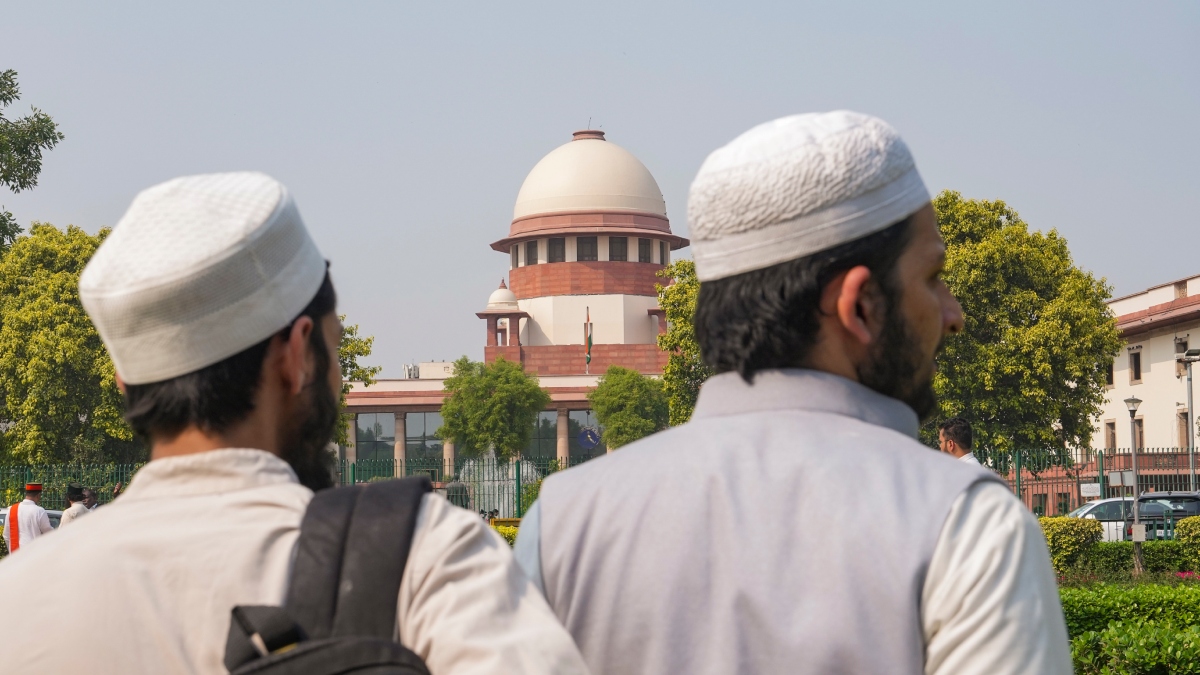Waqf Amendment Act: Supreme Court fixes hearing for May 20 on interim relief
 The Supreme Court questioned the Centre about the decision having non-Muslims as majority members in Waqf Council | PTI
The Supreme Court questioned the Centre about the decision having non-Muslims as majority members in Waqf Council | PTI
The Supreme Court on Thursday agreed to hear on May 20 a batch of petitions challenging the Waqf Amendment Act, 2025, and will consider whether interim order is required on three issues - Waqf by user, nomination of non-Muslims to Waqf Council and Boards, and identification of government land under Waqf.
A bench headed by Chief Justice of India B.R. Gavai clarified that it would not consider any petition challenging the validity of Waqf Act, 1995, by Hindu parties while considering the need for passing any interim order on May 20.
The court took note of the statement given by Solicitor General Tushar Mehta—that the Central government would not enforce the provisions of the Act—would remain in effect.
The top court while adjourning the matter said that it will only give two hours to argue the case to each side.
The order was issued during the hearing of multiple petitions challenging the constitutional validity of the Waqf (Amendment) Act, 2025.
The amendment was passed by the Lok Sabha on April 3 and cleared by the Rajya Sabha a day later. It received Presidential assent on April 5. The Act modifies the Waqf Act, 1995, which governs properties dedicated for religious or charitable purposes under Islamic law.
A batch of petitions have been filed before the Supreme Court contesting the legality of the amendments. These include challenges from Congress MP Mohammad Jawed and AIMIM MP Asaduddin Owaisi and many other individuals.
Petitioners argue that the amendments unfairly single out the Muslim community, undermining their constitutionally guaranteed right to manage religious affairs under Article 26 of the Constitution.
Supporting the Centre’s move, six BJP-governed states—Haryana, Maharashtra, Madhya Pradesh, Rajasthan, Chhattisgarh, and Assam have intervened in support of the amendments. These states have filed applications emphasising their concern over potential legal and administrative complications should the amendments be struck down.
However, defending the amendment, the Union government told the Court that the changes were intended to curb the misuse of Waqf provisions, which had been exploited to illegitimately claim private and public lands. According to the government’s written submission, since the 2013 amendment to the Waqf Act, there had been a 116 per cent increase in reported auqaf (Waqf) land area, raising concerns of widespread misuse.
'Waqf by user' refers to land or property that is considered Waqf due to its long-term use for religious purposes. Even without formal documentation or a written deed, such property could be declared 'Waqf by user', depending on its usage over time.
"It is submitted that despite the existence of the concept of 'Waqf by user', the requirement of registration or self-declarations before the Court were made mandatory in order to ensure that the regulatory provisions of the enactments achieve the intended objectives. It is submitted that therefore, there has been a clear and mandatory legislative regime, which has sought to enforce and implement registration requirements on all kinds of Waqfs since at least 1923," the affidavit reads adding that Centre said that it is too late in the day for anyone to claim today that although it claims to be a genuine Waqf, it is still not registered.
On the issue of trusts created by Muslim persons will not be governed by Waqf Act, the affidavit stated, “The Amendment Act reaffirms that identification, classification, and regulation of Waqf property must be subject to legal standards and judicial oversight. It is submitted that the legislative design of the Waqf (Amendment) Act, 2025 ensures that no person is denied access to courts, and that the decisions affecting property rights, religious freedom, and public charity are made within the bounds of fairness and legality. It is submitted that through these changes, the Amendment Act brings judicial accountability, transparency, and fairness.”
India